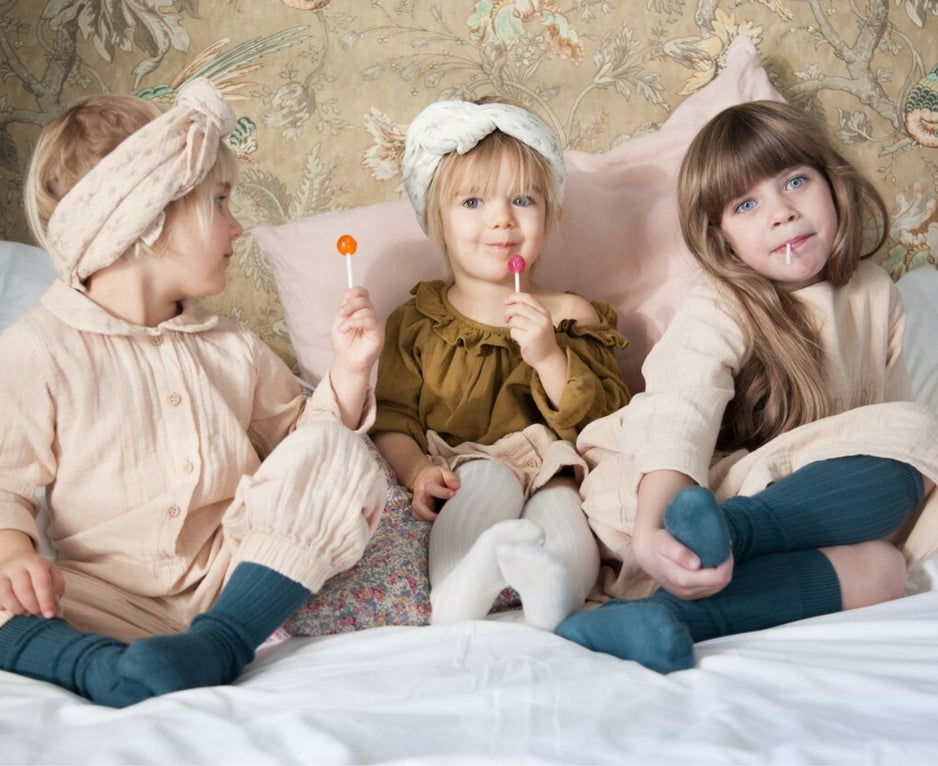
Different Fabrics – Different Needs
At Elves in the Wardrobe we are aware of babies & kids changing needs. When selecting our products, we are specifically looking for organic fabrics that will meet these needs.
Clothes that are extra soft and provide breathability, warmth and durability are key to happy and healthy young ones.
To give you a better understanding, we have put together a little list of fabrics and their specific qualities to help make the right choice when ordering baby & kids clothes online:
1. Organic Cotton
Above all there is the organic cotton. Everything starts here for us.
Organic cotton is fine, soft and strong. It is the ideal fabric for a baby’s sensitive skin as it is grown and processed without the use of harmful chemicals.
Conventionally grown cotton is one of the most destructive crops grown in the world today, whereas organic cotton farming promotes clean air, water and soil. Organic Cotton does not endanger wildlife or human health. So, you can rest assured you are getting the purest product for your baby.
Cotton can absorb about 20% of its own weight in moisture without feeling wet. It is pleasantly soft to wear, is permeable to air and actively breathes. It is highly resistant to friction and tearing. It tolerates high temperatures and can easily be washed at over 150°C.
It is perfect for sensitive baby’s skin and children with eczema.
2. Muslin
Organic cotton muslin offers unrivalled comfort with softness, superior moisture drawing, temperature control and extraordinary breathability. A naturally light fabric, it allows for maximum airflow which makes it the perfect fabric for the hotter months.
Our French Eco label Poudre produces their entire range out of soft double layered organic cotton muslin and has quickly become our summer favourite.

3. Rib
This is a fantastic baby fabric.
It's super soft with that bit of extra stretch to accommodate growing babies, but enough fabric integrity so that they will not stretch out.
4. Sweatshirting
Made from super soft and comfy 100% organic cotton knit fabric which is beautifully soft against the skin and makes a great mid weight layer for the in between seasons and cooler periods.
5. Cord
Made from certified organic cotton corduroy which is incredibly soft while remaining durable. Corduroy is the perfect weight for when your baby starts crawling and are on the go as well as for active kids who love going on big adventures.

6. Pointelle
Organic pointelle is a fabric with a nostalgic quality, perfect for new babies. Super soft and stretchy, this delicate fabric encourages warmth retention and moisture wicking with its thermal quality and open weave.
7. Terry
Soft and fluffy organic terry fabric absorbs moisture, while keeping its softness & temperature.
German Eco toy label Nanchen Natur creates the most beautiful soft toys, baby rattles & dolls made from 100% organic terry fabric.
8. Cotton Knits
Soft organic cotton knits have a lovely classic knitted texture. Ideal for keeping your little one snug during those season transitions.
9. Pure Merino Wool
It insulates, absorbs body moisture, breathes and is soft and non-irritating. This is very important for babies who still have fragile temperature mechanisms. Medical research at Cambridge University showed that lamb’s wool has a soothing, swaddling effect on babies, resulting in better sleep, reduced stress, greater contentment and improved weight gain. Studies showing similar results were reported in the British Medical Journal, Lancet, and the Australian Medical Journal.
Lying directly on lamb’s wool decreases a baby’s activity rate, producing a deeper, more restful sleep, and promoting a faster growth rate.
The wool has a so-called natural thermo regularization quality. Wool can take up water in the fibre inside. However, the surface pushes off water. It can take water up to one third of its dry weight without feeling humid and it derives humidity substantially faster than say cotton.
As woollen articles (referring to their whole volume) consist of up to 85% of air, they are good warm insulators. The body warmth escapes only a little. Therefore, colloquially one says that wool "warms" well, although wool of itself only reflects the heat radiation of the body.
Wool badly accepts dirt, is sweat-resistant and antistatic. Through its "recovery capacity" wool hardly creases, as the fibre is very elastic. Wool articles are virtually non- iron.
Wool is very colour-resistant and hardly inflammable. It doesn’t burn but carbonizes only.
Wool accepts few smells (e.g., from sweat) in contrast to art fibres, and has a natural self-cleansing function. Taken up smells are secreted to the air and the wool smells neutrally and freshly again after a short time in the fresh air. Wool can chemically bind sweat and urine and therefore neutralize them for a long time.







